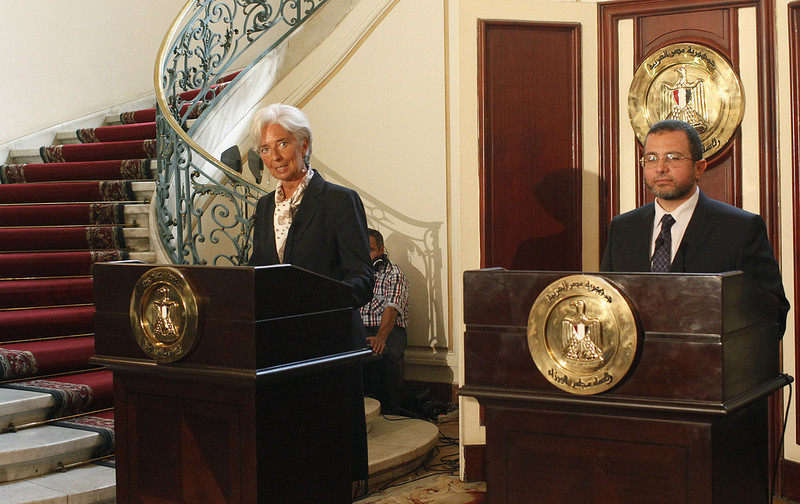
The arrival of an IMF team this week in Cairo has naturally set off a wave of speculation about the likelihood of an IMF program. Minister of Planning Ashraf Al-Araby said today that agreement would be reached in a couple of weeks, which would presumably mean the program would be finalized at the IMF Spring Meetings in Washington during April 19-21, which the Egyptian economic team will be attending.
So is a deal finally in the works? Of course, we have been down this road before in 2011 and 2012, and in each instance the Egyptians decided not to go ahead and the deal unraveled. Is it different this time? There are two ways to read the signals coming out of Cairo. First, the IMF team is in fact negotiating the details of a program, notably relating to the fiscal component, with a view to reaching agreement by April 15 when the IMF team is due to depart. If true, this implies that the IMF has relaxed its insistence on the program having broad political support. In the current polarized political environment in Egypt, the chances of reaching political consensus on a program are pretty small. It is highly unlikely that the opposition parties would be ready to sign onto the program. But then again, the IMF was willing in both 2011 and 2012 to go ahead without getting a green light from the opposition so it may do that again.
A second view is that the IMF team is in Cairo only to continue discussions on the program but not to reach an agreement before parliamentary elections are held later this year and a new government takes office. Therefore, one should not read too much into the IMF team presence in Cairo right now. In fact, when a country asks the IMF to send a team, or a “mission” in IMF parlance, to have discussions on a program, the IMF almost always obliges without any commitment to reaching agreement. The economic program could well be finalized by both parties during this visit, but it would still require clear evidence of domestic political support for it to be taken to IMF management and the Executive Board for final approval. This interpretation of what is going on in Cairo seems to be more plausible than the first one.
Undoubtedly, the IMF program is essential for Egypt, both to put in place the right economic policies and reforms to raise the growth rate and create jobs as well as to obtain the external financing that is conditional on the country having an IMF program. But it is not a silver bullet. Even with an IMF program there will be a sizable external financing gap, which will need to be filled. During the coming fiscal year (July 2013-June 2014) the external financing needs are projected to be about $18 billion, made up of foreign debt servicing of around $12 billion and a current account deficit of $6 billion (a little less than 3 percent of GDP). To this number one would need to add any increase in international reserves, which the minister of planning announced on April 2, would be about $2.5 billion to reach a target of $16 billion by the end of the year. In sum, the external financing needs would amount to a little over $20 billion.
Identified external financial support falls considerably short of the external financing needs. The IMF itself would provide $3 billion of the $4.8 billion in the first year of the program. Most commentators assume wrongly that the entire $4.8 billion of IMF money will come in right away in the first year. This is not true because IMF financing comes in tranches spread over the duration of the program, and $3 billion in the first year is probably at the upper end of what the IMF would provide. Other definite financing amounts to about $9.5 billion, which includes financing that has been “pledged” by Egypt’s Arab friends—Libya ($2 billion), Iraq ($2 billion), and Saudi Arabia ($2.5 billion). In the best of circumstances if all that is promised is delivered, this still leaves Egypt with a gap between its financing needs and available financing of about $10 billion.
How will this $10 billion gap be filled? Presumably, part of it could come from a rollover of a portion of Egypt’s maturing external debts. The IMF could be asked to increase the size of its loan, although the minister of planning ruled that out on April 4. Clearly, domestic adjustment, specifically tighter fiscal and monetary policies, could lower the projected current account deficit, but there is a limit to the degree of austerity that can be imposed on the population, particularly in the present political climate. Egypt could also borrow abroad and will most likely do so through the issuance of Islamic bonds (“Sukuk”). It could also use the $1 billion US loan guarantee to borrow in the international capital markets. Finally, it could use some of its foreign reserves even though at $13.4 billion they are dangerously low and some build up is needed to provide insurance against shocks. If all these actions do not generate the $10 billion, Egypt would need to once again try and tap the Gulf countries to make up the shortfall.
The bottom line is that even with an IMF program, the Egyptian economy, and particularly its balance of payments position, will remain vulnerable. However, better a program than no program. To reduce external vulnerability and get the domestic economy on track and growing, Egyptian policymakers have their work cut out for them. The coming year is not going to be an easy one for Egypt.
Photo credit: International Monetary Fund
Image: Lagarde%20in%20Cairo.jpg
